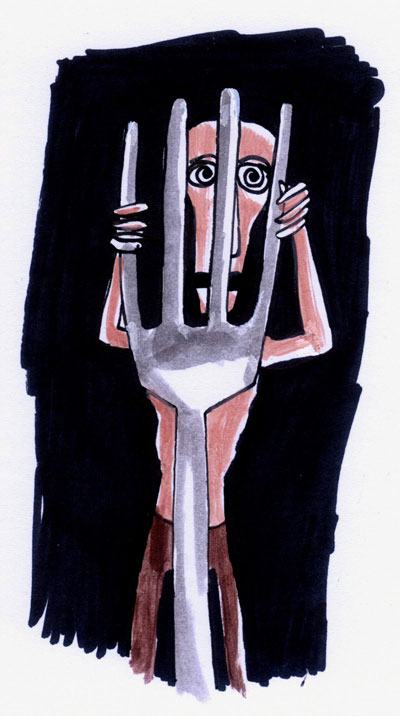 Every Saturday, we’ll be posting a new illustration by David Lester. The Mecca Normal guitarist is visually documenting people, places and events from his band’s 27-year run, with text by vocalist Jean Smith.
Every Saturday, we’ll be posting a new illustration by David Lester. The Mecca Normal guitarist is visually documenting people, places and events from his band’s 27-year run, with text by vocalist Jean Smith.
Carol pulls several folded pages out of a small, dog-eared, spiral-bound notebook. The stapled sheets are called A Proposal For The Dartmouth Summer Research Project On Artificial Intelligence. She looks at the first page of the notebook where her mother, Verna-Lee—a certified genius at age five—had printed in tidy rounded letters.
July 15, 1956
They want to make a machine that can think. If a machine can use words to solve a problem, then a problem can be solved using math. One man asked me questions about words, but I don’t think he liked my answer. He made a face and looked away. He wants to know if English is the most logical language to use for the thinking machine. I keep telling him math is the most logical language for any machine.
In another notebook, Carol finds a reference to both anarchism and feminism, written when Verna-Lee was 15.
October 12, 1967
The visitors from New York held a meeting to rap about the women’s liberation movement and how it affects higher education. Since I’m the only female in human sexuality research, I was the only one who could attend the women-only meeting. One of the New York women explained that there were basic questions they used to get things going, one of which was about having a child. If, when we thought about having a child, would we rather have a boy or a girl? When it was my turn to rap, I said I had a child, so I couldn’t answer. One woman—Margaret—thought I was being a smart Alec. Or, in this case, a smart Alice. She asked how old I was and where I lived and why I was involved in research at Princeton. She pretty much subverted the whole rap session into questioning me. I wouldn’t tell them if I had a boy or a girl, because logically, I was disqualified from responding. She was waving her papers around at me, trying to get me to answer a different question. She wanted me to imagine not having a child. Now which would I prefer? A boy or a girl? I told her she needed to re-think the logic of her question. Before I knew it, I managed to add that I’m drawn to anarchisms for stimulating material on progressive social change and not any one strain of feminism. At this point, she really lost it. She asked who sent me, who was I really. Her friends suggested she sit down and that maybe someone else could rap about whether they’d like a boy or a girl, but nobody else wanted to rap very much after that. I talked to one of the other women after the meeting ended. I told her anarchism logically included feminism, and she seemed a bit happier. Maybe I reminded the woman who had the hairy of her kid sister. She sure reminded me of my sisters, not that my sisters would ever be at a meeting about feminism, but they are just as illogical.
Flipping through a later notebook, Carol finds a section written in Chicago, at the Democratic Convention in 1968. Verna-Lee would have been 16.
Chicago, August 27, 1968
Of all people to bump into. Margaret from the New York women’s group that visited Princeton last year. She didn’t recognize me, and then she was suspicious of my being there. She asked me where my son was. She knows very well I never said if I had a daughter or a son, but I told her Carol is with my parents. The matter at hand is so much larger than our little meeting. Not the time to hold a grudge. Turns out Margaret left the women’s group to join the peace movement. She went to the meeting in the spring in Lake Villa to plan the protest march, but she’s definitely more frightened than angry about the cops attacking people. She’s going to hear the speeches in the park, too. She was there, too, when the speaker on the stage, a Black man, said that whether we like it or not, we’re responsible for this sick and insane nation. She doesn’t think the cops attacked because of any one comment, though. I’m not so sure about that.





